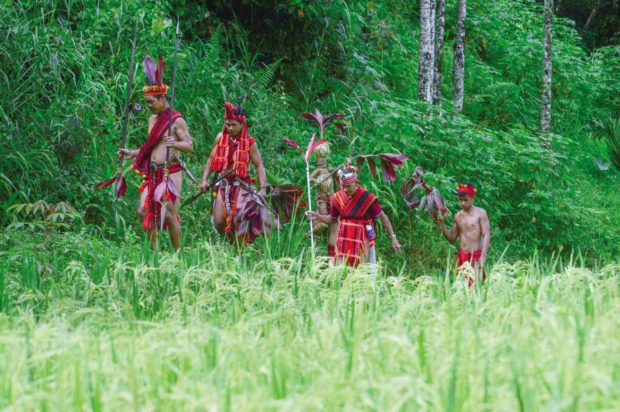IP workers from 6 countries tapped for carbon accounting

AGE-OLD TRADITION Farmers who tend to the rice terraces of Ifugao province march to the river to celebrate a bountiful harvest. —KARLSTON LAPNITEN
SOLANO, Nueva Vizcaya — A global environmental organization has tapped 18 indigenous peoples (IP) workers from six countries, including the Philippines, to do carbon accounting to protect forests and reduce greenhouse gas emissions.
Dr. Carly Green, founding director of Environmental Accounting Services (EAS), said four IP workers from Mindanao and the Cordillera had undergone an immersion-training on carbon accounting with 14 IP workers from Bhutan, Indonesia, Nepal, Vietnam and Fiji.
Carbon accounting is measuring where emissions come from and where they are absorbed.
Protect forests
“[Carbon accounting] is a tough activity but it is something IPs need to know to plan and protect their forests, which are their homes,” said Grace Guid of Maguindanao-based Timuay Justice and Governance.
Article continues after this advertisementThe training, led by EAS, was held here and in Santa Fe town from March 25 to 29.
Article continues after this advertisementEAS is a New Zealand-based consultancy firm specializing in carbon estimation approaches, greenhouse gas policy and forest monitoring systems.
“IPs are custodians of the land. They are the foremost affected by any change in the climate since they live in the watershed areas,” Green said.
She said the training provided participants with simplified step-by-step forest carbon accounting tool kits that they could use in training their IP communities.
Helen Valdez, member of Tebtebba Foundation Indigenous Peoples’ International Center for Policy Research and Education, said IPs needed to learn technical methods and increase their awareness and knowledge on emission reduction.
Tebtebba is a nongovernmental organization with consultative status to the United Nations Economic and Social Council.
“This capacity-building will further strengthen existing traditional approaches in managing watersheds, which are the foremost tool in reducing carbon emission,” Valdez said.
Emissions rising
The Philippines had 1.6 tons of average per capita carbon dioxide equivalent emissions in 2012, far below the global average of 6.5 tons, according to a study by the Asian Development Bank published in the 2017 book “Pathways to Low-Carbon Development for the Philippines.”
However, emissions are significantly rising rapidly, with 4-percent annual growth between 2006 and 2012, primarily from transport and energy sectors, the study said.
The country is losing 47,000 hectares of forest cover every year, according to data from the Forest Management Bureau of the Department of Environment and Natural Resources (DENR).
In 2010, the forest cover diminished to 6.8 million ha from 7.2 million ha in 2003. —Karlston Lapniten